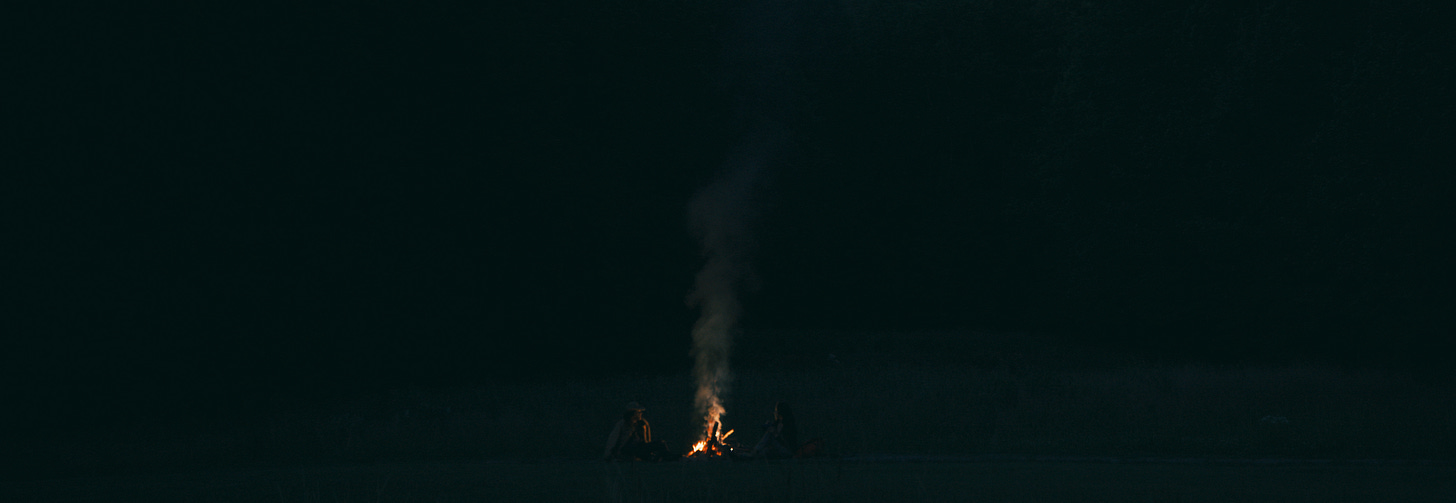For anyone who may be interested in hiring me to write music for a film, let me save you some time: I didn’t learn anything.
I nailed every cue on the first try, I hit the exact emotional beats the director was looking for, and I delivered all of my music three weeks before the agreed deadline.
So feel free to click away now and reach me via email where we can discuss my rates and wine preferences.
…
Okay.
Now that they’re gone…here’s how it really went.
I. Exposition
When a friend asks you to compose music for a short film they’re making, you say yes. After all, you went to college (in part) to learn how to score films, you’ve scored plenty of student films in the past, and you’ve even worked with this friend on a previous project that turned out pretty good.
The assignment for this new short was clear:
Genre: Neo-Western
Vibes: Dark, Melancholy
Primary instrument: Guitar
I, a guitarist, was quite pleased with this arrangement. A Western-rooted score featuring acoustic guitar is basically a home game for me. Plus, the initial plans only involved a minute or two of music—most of the short would play out in silence.
With no hesitation (and certainly no surrender), I volunteered my services.
Five months later, I can say with certainty: that was way harder than I thought it would be.
II. Development
I present to you my five months of composing, distilled into five lessons. I’m recording these largely for my own benefit, so that I don’t have to learn them again next time I score something. Nonetheless, I believe that they are generalizable enough to be of interest to anyone.
I hope you find them both entertaining and instructive.
Month 1: Finding Inspiration
“You can’t make lightning strike. But you can stick a fork in an outlet.
- Caleb Schilly
Inspiration is fickle and annoying. It’s not there when you want it to be, and it is there when you don’t.
The first couple weeks of composing involved many hours of me sitting with my guitar, keyboard, or computer trying to find a melody that could serve as the main theme of the short. Most of those hours came and went with little or no progress made.
Melodies presented themselves to me when I was least ready to receive them—in the shower, about to fall asleep, on the toilet, etc. In these inopportune moments I would think to myself: Wow that’s really good; I’m sure I’ll remember it in five minutes.
Reader, I did not.
So yes, one takeaway is this: don’t waste a moment of inspiration. No matter how catchy or seemingly memorable the idea is, in the future I’ll be sure to immediately whip out voice memos, rush to my computer, or scrawl out some notes on toilet paper.
And yet, even if I was fully prepared for every moment of random access creativity, I would have ended up with about thirty seconds of music. Lightning simply doesn’t strike that often.
Therefore, probably the most important thing I learned from this project is how to manufacture circumstances that lead to inspiration.
At first, I tried to force inspiration by:
Reading and rereading the script
Watching movies in the same genre as the short film
Listening to music with the right vibe
However, I gradually learned that these activities didn’t work for me. I needed space for my brain to think without being told what to think about. I needed silence.
Thus, for the first time in years, I found myself going for walks with no earbuds in. I listened to nature, if you can believe it. Nature and nearby people arguing.
And, almost without fail, these walks recharged my artistic battery. I would get back and suddenly draft up a theme like it was there the whole time.
Month 2: Time Management
Avocados that haven't fully ripened will lack the big flavor you want for your dip.
- Guy Fieri
It took a really long time to write this score.
Like, way longer than I thought it would.
As I’ve said, I wrote about six minutes of music over the course of five months. Much like a washed-up Tony the Tiger, that’s not great.
Truth be told, it was pretty demoralizing. I really like writing scores. I tend to think I’m pretty good at it. Even worse, I want to do this for my career.
Then why was it so hard???
It was hard to get the tone right. Then it was hard to get the themes right. Then it was hard to get the timing right. Then it was hard to get the mix right.
I mentioned that I’ve written scores before. These were for the Carolina Film Association (CFA), a club at UNC-Chapel Hill where students come together to make short films. “Production season” for CFA is the spring semester—from January to April. In this time, each production will cast, shoot, and edit their short film.
This guarantees a tight schedule, especially since shooting days have to be coordinated among several full-time students’ schedules. From the composer’s perspective, this leaves very little time to work. Usually I would write the music based on the script, send my first drafts to the editor, and then wait until the final cut was posted on YouTube.
This time, though, I had time. Time to flesh out the score, to develop themes, to scrap entire cues and try again. Then, even after I had written and rewritten the content of the score, I had time to sync it up with the film and ensure that all moments were lining up like they should.
It was incredibly difficult and fun and frustrating and satisfying.
But more than anything, it was a far more lengthy process than I had anticipated. The ocean between a passable score and a good score is vast. Just when I thought I was finally coming in to harbor with a completed soundtrack, I would notice a stray guitar pluck, or a misplaced note, or a faulty export, and I was swept back to sea.
Doing something right takes time.
Month 3: Starting Over
“If at first you don’t succeed, clear your hard drive.”
- Anonymous
Something comforting that I learned in the process: it’s okay to miss.
In fact, this axiom was so comforting that I couldn’t stop exercising it. I must have missed over twenty times.
It’s not that I was writing bad music. In fact, most of the drafts I drew up were pretty good. They were interesting, creative, and nice to listen to.
But more often than not, they didn’t match the emotion of the scene, and so they had to go. In the end, that’s the whole point of the music: to underscore the feelings that the film is meant to elicit.
I held on a little too tightly to some of these cues; if I had been willing to relinquish them sooner, I probably could have saved a lot of time. Instead, I wasted hours trying to contort a semi-cool ditty into a completely different shape.
Month 4: Motivating the Music
“An object at rest will remain at rest until [you write some banging music for it].”
- Sir Isaac Newton (paraphrased)
When you watch a movie, you probably don’t notice when the music starts and stops. That’s because the composer doesn’t want you to. If you’re noticing the music, you’re not locked into the movie. Again, the point of the score is to help you develop an emotional response to the film—not to call attention to the music.
It’s really hard to not call attention to the music.
Ultimately, the way I (hopefully) accomplished this was via two tricks:
Fade in / Fade out
Motivate the music
Fading in and out is easy to understand and easy to implement. But it actually isn’t that effective, unless you pair it with the second point: the music must be motivated by something happening on screen.
If nothing is happening on screen and music starts playing, the audience will notice the music. After all, nothing else is going on…what else would they notice?
On the other hand, if something happens—maybe a character enters the frame or the camera moves—and the music starts in sync with that action, the audience will be too busy watching the action to notice the score easing in.
This was the bulk of my “timing” work on the score. There wasn’t much action that I had to sync the music to, so instead I focused on making sure that every moment in the music—not just the start and end but also changes in dynamics, pitch, or instrumentation—was motivated by something happening on screen.
If you listen to the first and final drafts with your eyes closed, the difference is likely negligible. Maybe the fade in starts half a second later or ends a half second sooner. But when you put the sound to the picture, it makes all the difference in the world.
Month 5: Calling It
“There comes a point in every man's life when he has to say: 'Enough is enough.’”
- Lance Armstrong
I’ve never truly run out of toothpaste.
I bet you haven’t either.
And yet here we are, buying new toothpastes and going on with our lives.
There are still lots of small things that I could add to the score, in the same way that there is still a cubic millimeter of toothpaste left in the tube at the bottom of my trash can.
At some point, you just have to say you’re finished and move on to the next project. I trust myself. I wrote something good. The director likes it. But, perhaps more importantly, I like it. And that’s good enough for me.
III. Recapitulation
Practice makes better practice, and this short film was tremendous practice.
I don’t have much more to say about the whole process; it was thrilling and challenging and at times daunting. Needless to say, it was also inspiring and fulfilling and extremely fun.
If you’re interested, you can watch the film here.
Oh, and if you know anyone who’s looking for a composer for their film…Maybe keep this article between us.







